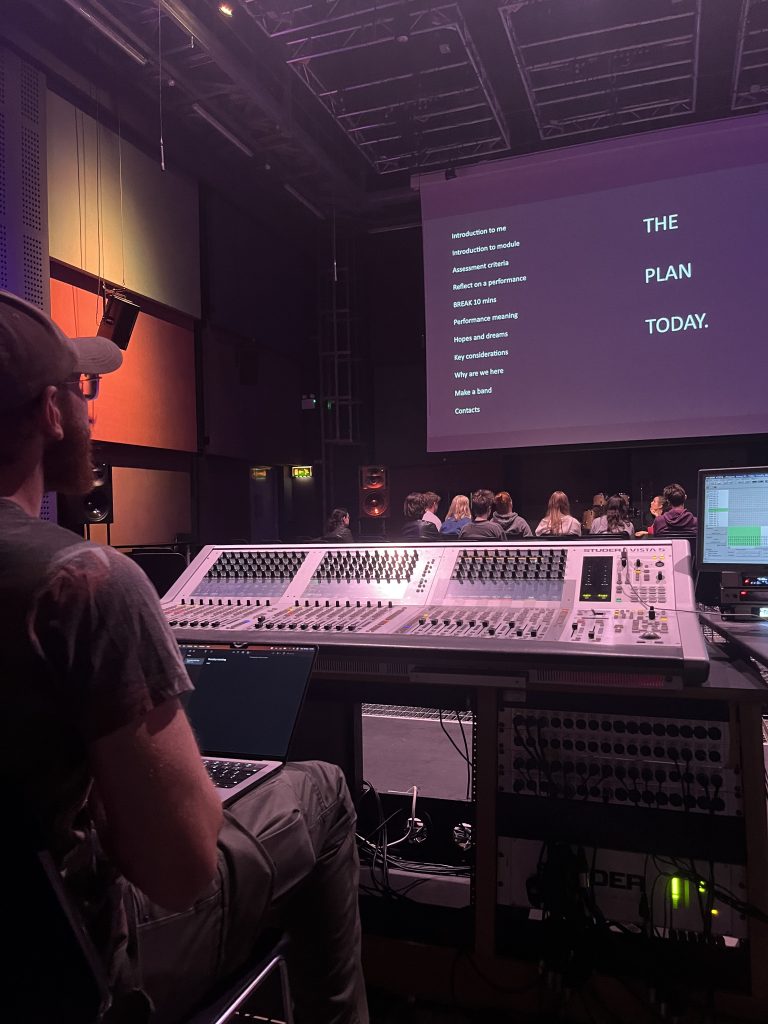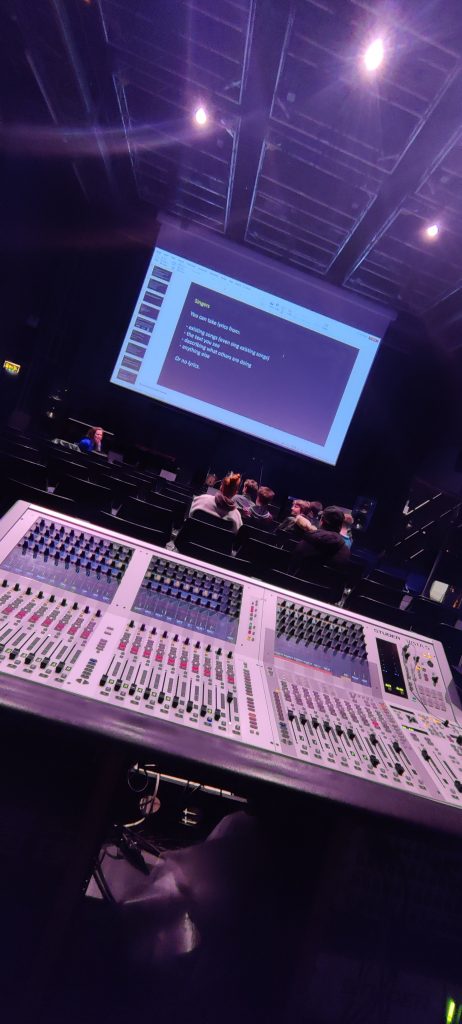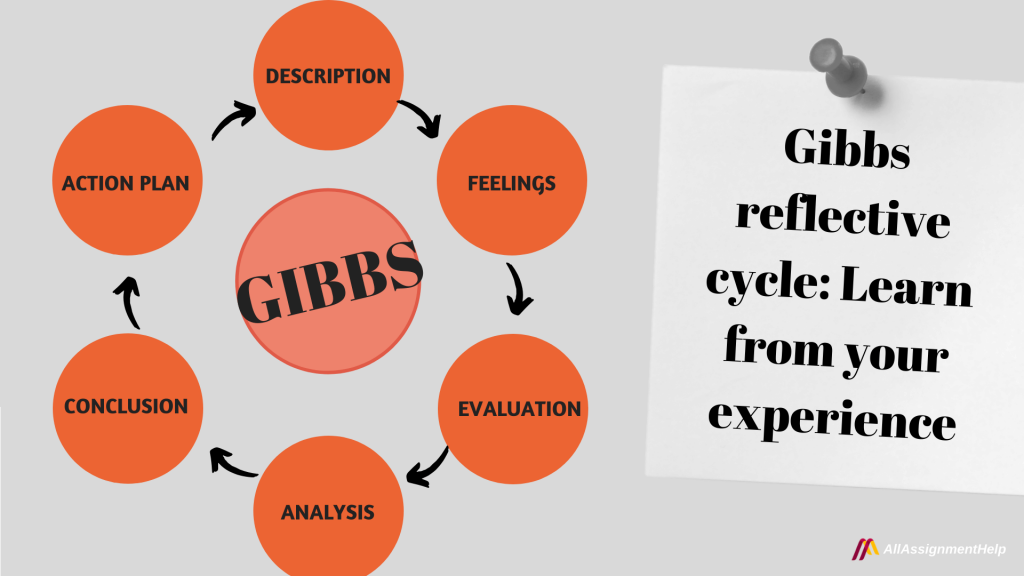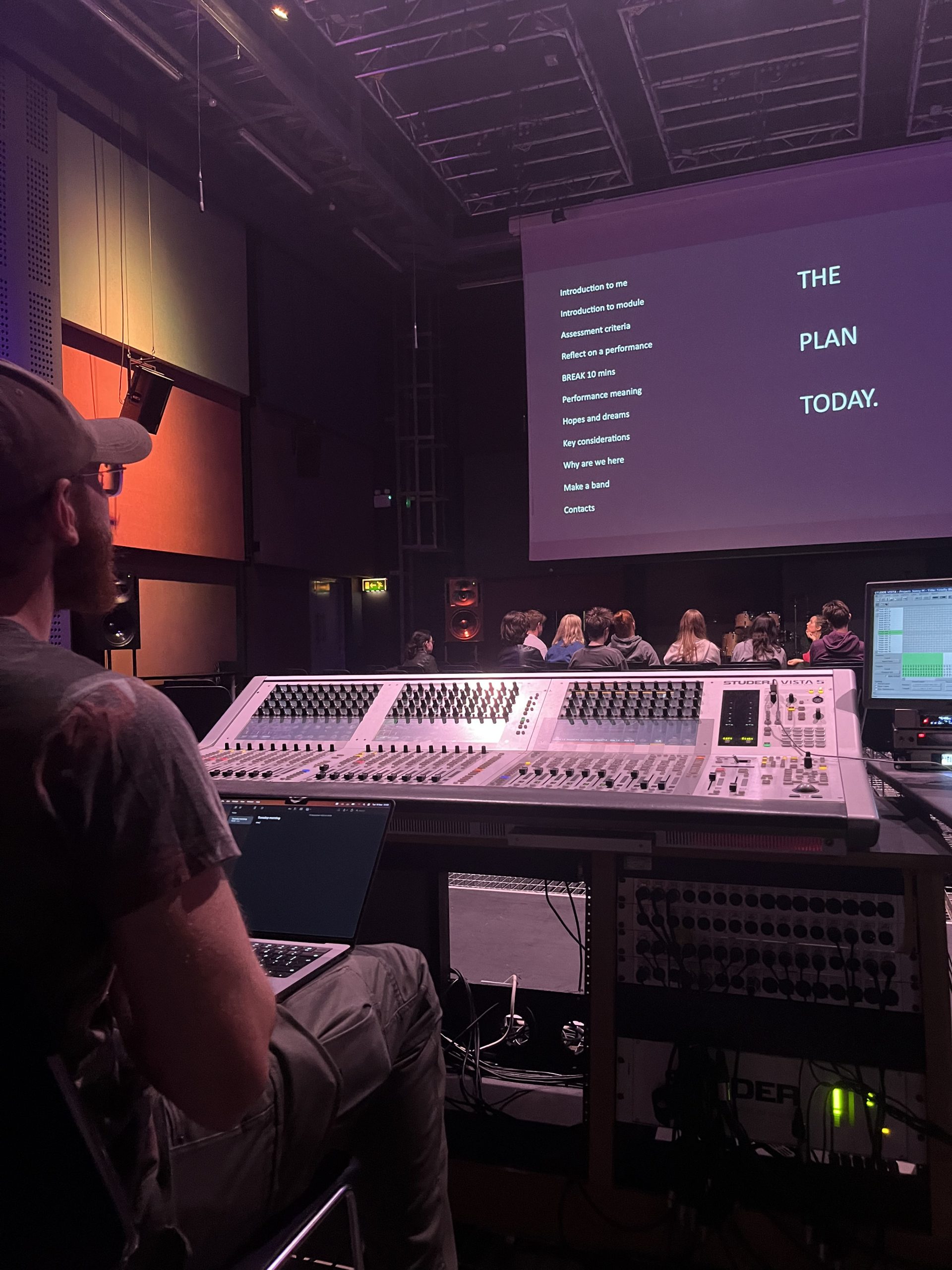
“They tend not to be looking specifically for great engineers, rather good all-rounders with a broad set of skills.”
Jon Burton. (2012). How To Become A Pro Live Sound Engineer- Sex, Lies & Gaffer Tape. [Online]. SoundOnSound. Last Updated: Nov. Available at: https://www.soundonsound.com/people/how-become-pro-live-sound-engineer [Accessed 16 November 2023].
I like the above quotation that I came across when I was looking for what type of placement I would be best applying for this year as it really made me stop and think about the big picture for my career post-graduation. I think that Burton’s quote is the best way I could sum up my time working as a sound technician in Queens University Belfast so far; an all-rounded experience requiring a very broad skillset from me. I have enjoyed every single second of working in my placement role this year and I am already dreading the finish date as I don’t want to leave my role behind.
We started the year off with an informal meeting at SARC where I met the team I’d be working alongside and got to meet my supervisors Jonny McGuinness and Craig Jackson. They laid out what we should expect for the year to come and the expectations they had for us throughout the year. This meeting left me feeling excited for what was to come and with a hint of imposter syndrome feeling like perhaps I was in over my head. Thankfully a couple of weeks working alongside Jonny and Craig and I quickly felt like I was in just the right place.
I have 2 main roles within my position at Queens, firstly I work with Kehan in order to setup for and run multiple classes in SARC each week. Secondly to assist on Thursday Mornings with setting up for the weekly Thursday Lunchtime gigs which are in-front of a live audience and also recorded and live-streamed online.
I’ll begin by reflecting on the lunchtime gigs that I have been involved with beginning with Tullis Rennie’s ‘Fixed freedoms’ as linked below:
This was a really interesting experience for me which began with the standard procedure of running cables and setting up the mixing desk accordingly. This is usually done when the performers arrive at around 10am so we can coordinate with them on what they need and how they would like their show to look, aesthetically speaking, as well as what suits them best for their style of performance. Tullis was an artist with a technical background so was very active in making sure that the visual and sonic experience was setup just right. This was the first time that I had setup for someone that had a vision in their mind and wanted to realise it with me. I learned that working in this format required as much if not more listening and understanding of Tullis’ requirements as it did actually setting anything up.
On top of the live mixing that goes on for the audience in person we also had to send a feed of the audio over to the SARC Video Team who were responsible for the recording of the visuals on the livestream. This involved doing a discreet mix within ProTools and then sending a stereo feed to the video team for them to capture everything together.
The resulting live stream is a great effort of combining skillsets from the lighting setup which Tullis, myself and my supervising team all set to be the best look for the live audience whilst also making sure that the video team were happy with the lighting and could capture everything they wanted too. Working as a team member in the audio team and as part of the larger scale team is great experience as it emulates real world scenarios that I am likely to find myself a part of in my future as an audio technician.

Moving on to my work within the context of engineering for classes, this has arguably been my biggest test of strengths so far. On a Tuesday morning early in September I find myself working alongside Kehan to run a class as smoothly as possible using the Studer mixing desk and ~32 speakers in the SARC lab all without the direct supervision of Jonny or Craig (whom thankfully are on standby should we encounter any issues).
Kehan and I both have a little experience in running live sound for gigs but doing the class we quickly realised that this was nothing like that. Where in a gig context we as engineers are given the time to sound check each band and ensure that they are able to hear themselves on stage and that the audience area has a true balanced listening experience, the classes involve up to 6 different bands all getting setup, sound checked and playing, back to back within a tight class timeframe. The resulting struggle for us as engineers who are still trying to get to grips with the system and desk is how efficient we must be in order to get through everyone in as quick a time as possible. The ‘soundcheck’ that we get to do consists not of taking the time to craft a well balanced mix but taking a more literal approach of simply ensuring that when they make noise we can hear it.
The players give us maybe 30 seconds of playing and in that time we have to work to ensure that both the stage monitors are sufficiently loud for the players and that the room can hear everyone on stage. There is no margin for error and even less for allowing feedback to come through and temporarily deafen anyone onstage or in the audience. After the brief sound check we give them the all clear and the band gets going with their performance. During their performance we then must listen to the sound and mix as necessary to ensure that there is a balanced sound in the room allowing everyone on stage to be heard accurately and clearly. The problem with doing this for a band that is only playing one or maybe 2 songs is that by the time we have dialled in the sound, they’re done and the next band is getting ready to start the whole process over again.
Una Monaghan who is the lecturer for Performance II has a very technical background and has done a lot of live sound engineering herself so she understands that what we’re doing is no mean feat and also likes to have input by asking for certain instruments to be louder or for effects to be added as and where she feels necessary. She also likes to keep things moving at as fast a pace as possible, cutting sound check times in half when she can. This often adds to the challenge we already face with such little preparation time and can sometimes leave performers claiming they “couldn’t really hear [themselves] on stage” or the audience feedback saying things along the lines of “I couldn’t really make out the lyrics as the vocals were very quiet”.
“The outcomes that learners most often value include increased confidence, a propensity to reflect and to want to understand, and a hunger for further learning and development”
Stan Lester & Carol Costley. (2010). Work‐based learning at higher education level: value, practice and critique. [Online]. Taylor and Francis Online. Last Updated: 26 Jul. Available at: https://doi.org/10.1080/03075070903216635 [Accessed 16 November 2023].
This statement by Lester and Costley regarding work based learning is true of my experience within the classes I am working in. The first few classes had a fair few comments that revolved around a poor technical job being done so X or Y wasn’t given the best representation of their performance. What I quickly had to learn was not to take the comments personally but instead look at how to improve my job and actively work on reducing the number of these comments in each class.

Using the Gibbs Reflective Cycle here is how I combatted the problems I was having in classes.
Description:
Short setup times resulting in poor sound and imbalanced mixes which lead to complaints from both performers and audiences.
Feelings:
I went from initially feeling like I wasn’t good enough to be doing the job, to feeling annoyed that I wasn’t shown how to do the job, all the way to feeling like it was unfair to expect a perfect balanced mix every time with no opportunity to hear or mix before the performers are on stage.
Evaluation:
When I sat with my feelings for a moment and thought about the problem what I realised was that I was taking the comments personally when in fact they had nothing to do with me as a person but instead were accurate and relevant about being unable to hear the performances which is a pretty key part of performance classes of this nature.
Analysis:
Removing my pride and my ego from the equation and not making excuses but instead focusing on how I could ensure I did a more efficient and better job each week until I stopped giving people the opportunity to complain about poor sound or imbalanced mixes is the only way I was going to improve the problem and in turn improve myself.
Conclusion:
Thinking back to the first few classes I feel it may have been helpful to ask Jonny or Craig to sit in with Kehan and I to give us some pointers and hints on how to navigate the desk but also some workflow tips that might have allowed us to be a little more efficient.
Action Plan:
Going forward I spent more time in the lab before and after classes learning the desk, learning where I could send sound in the room and how that might benefit certain scenarios. Chatting more to Jonny and Craig about how the desk works and also downloading the operating manual and having a read over some of the hidden functions and features. Further to all of this simply sticking at it and taking it one week at a time, reflecting on the good and bad of each class and improving on it week by week.
Bibliography:
Jon Burton. (2012). How To Become A Pro Live Sound Engineer- Sex, Lies & Gaffer Tape. [Online]. SoundOnSound. Last Updated: Nov. Available at: https://www.soundonsound.com/people/how-become-pro-live-sound-engineer [Accessed 16 November 2023].
Stan Lester & Carol Costley. (2010). Work‐based learning at higher education level: value, practice and critique. [Online]. Taylor and Francis Online. Last Updated: 26 Jul. Available at: https://doi.org/10.1080/03075070903216635 [Accessed 16 November 2023].
